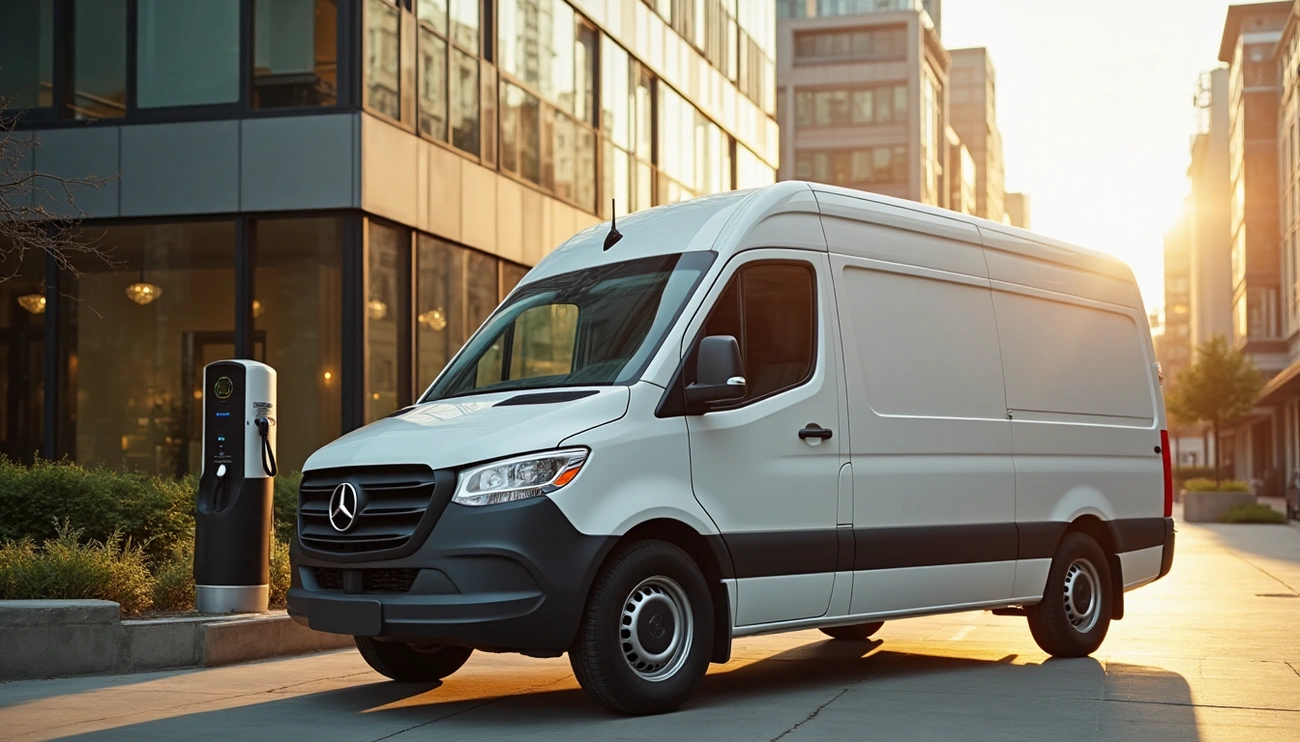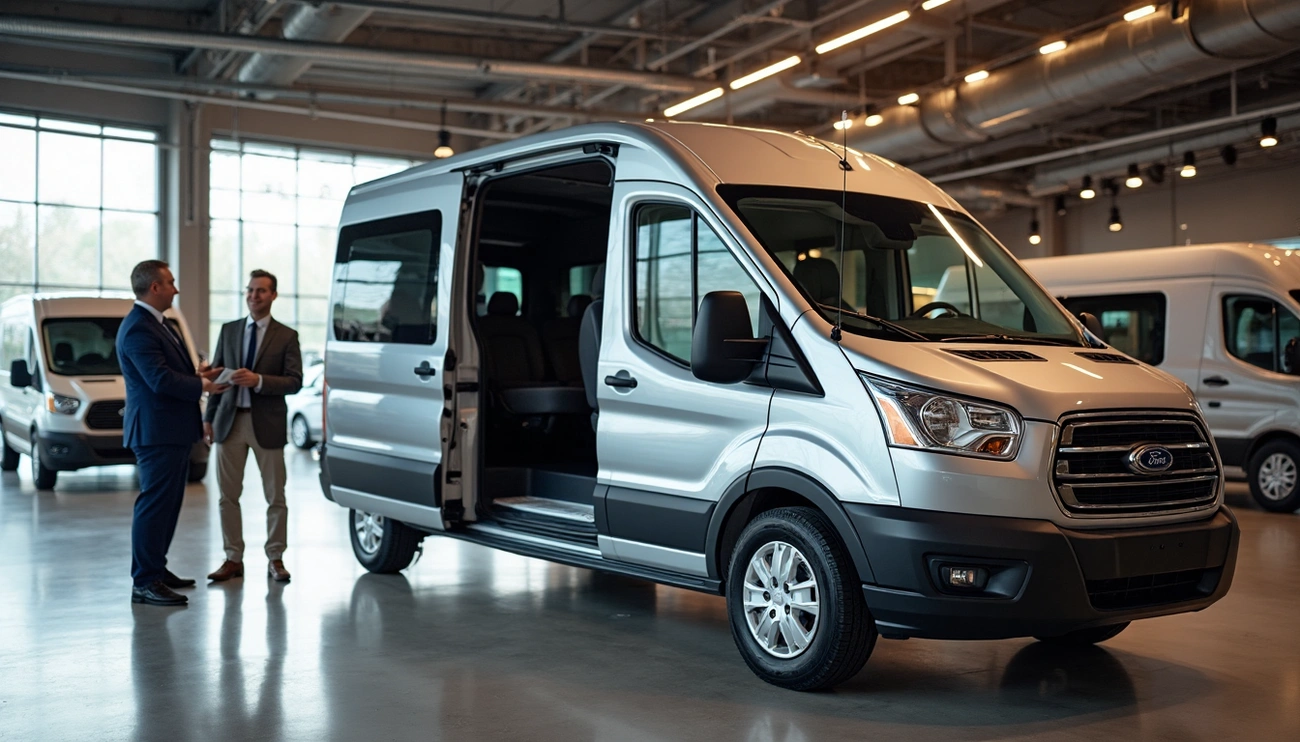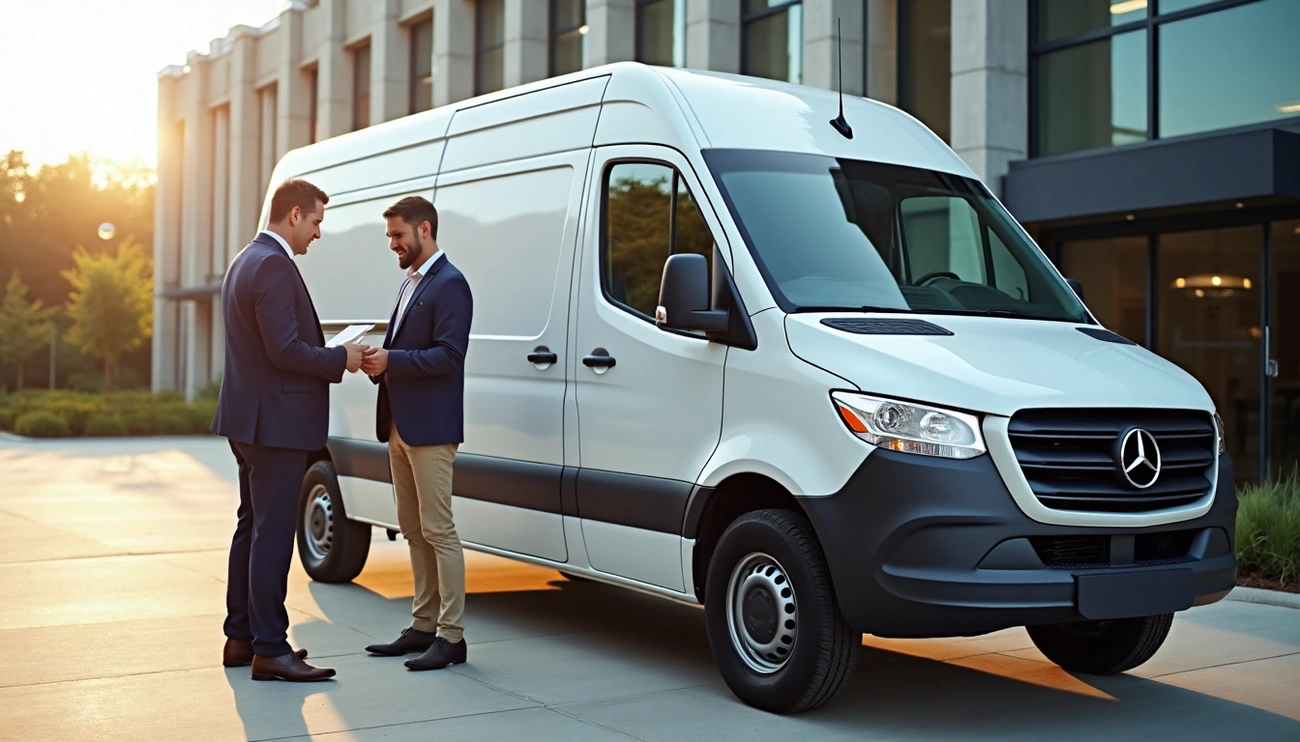Electric Van Finance: Powering Business
Did you know that switching to electric van finance can reduce your fuel costs by up to 60%?
Your business can adopt zero-emission vehicles through affordable electric van finance without huge upfront costs. Small vans usually cost £300-£600 per month, while larger models range from £400-£800. These monthly payments get balanced out by the money you save on fuel and maintenance.
On top of that, the government provides special grants and tax incentives for electric commercial vehicles that make switching more affordable. The total cost of owning an electric van turns out nowhere near as expensive as traditional diesel options. Source
Van finance options give business owners the flexibility to upgrade their fleet while keeping cash flow steady. This helps balance day-to-day operations with environmental goals. Learning about commercial van finance for the first time or comparing business options? Understanding available arrangements will lead you to the most economical choice. See self employed van finance
This piece will get into how electric van finance works and the types of agreements you can choose from. We’ll also cover key factors that shape your decision. Time to power up your business with a greener, money-saving solution! See business van finance
How Electric Van Finance Works
Electric van finance has become a budget-friendly way for businesses to switch to eco-friendly transportation without spending big money upfront. The funding arrangements are different from regular vehicle purchases because they’re specially designed for electric commercial vehicles.
What is electric van finance?
Electric van finance lets businesses get zero-emission commercial vehicles through payment plans instead of paying everything at once. This approach tackles the biggest problem with electric vehicles – they cost more to buy but less to run. These finance packages usually come with warranties that cover repairs and maintenance for set time periods, which gives businesses extra peace of mind when they switch to electric. See used van finance
Electric van finance stands out in three ways. The cost setup is different from regular financing since electric vans usually cost more than similar diesel models. The future value is harder to predict as battery technology gets better and self-driving features improve. Specialist lenders create deals that work with electric vehicles’ unique features.
Small electric vans usually cost £300-£600 per month, while larger models range from £400-£800. These fixed monthly payments help businesses plan their budgets without worrying about huge one-time costs or surprise repair bills.
How it differs from buying outright
Buying an electric van outright brings several financial challenges compared to financing. When you buy outright:
- Market value changes and maintenance costs affect you directly, especially if used vehicle prices drop
- Your money gets locked into something that loses value
- You miss the chance to invest that money to make profits
- The van shows up as a depreciating asset on your business’s balance sheet
Electric vehicles need extra thought because their technology keeps changing. Battery technology and self-driving features advance quickly, which means today’s electric vans might become outdated faster than expected. Finance deals help alleviate this risk of technological obsolescence.
Typical contract terms and structure
Electric van finance deals usually last 24 to 60 months, and rates change based on which financing method you pick. Most deals follow this structure:
- Initial payment – You pay 3-9 months’ worth as a deposit
- Regular monthly payments – You pay fixed amounts throughout the contract
- Mileage allowance – You get yearly usage limits
- End-of-contract options – These change based on finance type (return, purchase, or extend)
Each finance option comes with different terms. Business Contract Hire (BCH) works like a simple rental – you give the van back when the contract ends. Finance Lease gives you more freedom without mileage limits or damage charges, and you can choose lower monthly payments plus one big payment at the end. Hire Purchase leads to ownership through monthly payments over 2-5 years.
VAT-registered businesses get extra benefits. They can reclaim VAT on monthly rentals if they use the van only for business. Monthly rentals count as business expenses too, which reduces taxable profits.
These foundations of electric van finance help businesses choose the right deal for their needs and financial goals. See van finance lease
Types of Electric Van Finance Options
Learning about different financing methods helps realize the full potential of your electric van investment. Each option brings unique advantages based on your business needs and financial goals.
Business Contract Hire (BCH)
BCH is a straightforward rental agreement that lets your business use an electric van without owning it. You choose your original rental amount and pay fixed monthly payments throughout the contract term, usually 36 months. The vehicle goes back at the end of the agreement, which removes any worries about depreciation or resale value. See van finance companies
BCH comes with extras that cut down on paperwork. Vauxhall’s BCH package, to name just one example, has Road Fund License and European breakdown assistance. Monthly payments for vehicles like the Vivaro Panel Van Electric start at £565, with an original rental of £3,390. Your costs stay the same throughout the contract period, which makes budgeting easier.
Finance Lease
Finance Lease gives businesses more flexibility when they want to handle their own vehicle administration. This option comes in two forms – both with low monthly payments and possible financial returns when the contract ends.
The first form uses standard monthly payments throughout the lease. The second lets you make lower monthly payments with a final balloon payment based on the van’s expected resale value. Businesses can manage their cash flow better this way, depending on their financial situation.
Finance Lease stands out because it doesn’t have mileage restrictions or damage charges that you often see with other financing methods. On top of that, the vehicle shows up on your company’s balance sheet, which could mean tax advantages for VAT-registered companies.
Hire Purchase
Hire Purchase creates a clear path to ownership through monthly payments that fit your budget. You buy the electric van over time instead of paying everything upfront. The van becomes yours after you complete all payments, including the purchase fee.
Businesses looking for long-term electric van solutions don’t need to worry about vehicle condition or mileage like they would with leasing. Just like Finance Lease, business users can defer part of the cost to a balloon payment, which leads to lower monthly payments during the agreement.
Short-term vs long-term leasing
Your finance agreement’s length affects both your monthly costs and flexibility. Short-term leasing typically runs for about 12 months and works well for businesses with temporary transport needs.
Short-term arrangements offer these benefits:
- No long-term commitments
- A chance to test different van types before longer commitments
- Lower upfront costs
All the same, you’ll pay more each month – 12-month lease deals start at about £349.
Long-term leasing (24-60 months) brings stability and better cost efficiency. Monthly payments drop when spread over longer periods – 36-month lease deals start around £329. This option suits 3-year-old businesses that need consistent transportation.
Long-term agreements have one main drawback – you’re stuck with one vehicle setup. Early termination can cost you dearly if your business needs change. Take time to think over your future needs before choosing longer terms.
Short-term options give businesses a chance to test real-life range capabilities and charging infrastructure needs before making longer commitments. This “try before you buy” approach helps make smarter long-term decisions about electric vans.
Benefits of Financing an Electric Van
Electric van financing offers more benefits than just getting a new vehicle for your business. Here’s why many companies choose finance options instead of buying outright.
Lower upfront costs
You can get zero-emission vehicles without spending large amounts of capital through electric van financing. The payments spread evenly over time, which makes the expense easier to manage. This makes sense because electric vans cost more than diesel ones at the start. Your business can keep its working capital for core operations rather than locking funds into assets that lose value.
Predictable monthly payments
Fixed monthly costs make electric van finance an attractive option. Small vans cost between £300-£600 each month, while larger models range from £400-£800. These steady payments take away the stress of one-time purchases or unexpected repair costs. Your company can plan budgets better because you know exactly what to pay each month.
Access to latest models and tech
Leasing or financing an electric van lets you use cutting-edge technology without owning it. Electric vehicle technology improves each year, and finance agreements let businesses switch to newer models with better range and efficiency after their term ends. Your business stays up-to-date with tech improvements without getting stuck with older vehicles.
Tax incentives and grants
Government support makes electric van finance look even better. Pure electric vans don’t pay Vehicle Excise Duty (road tax) and have zero Benefit-in-Kind tax rates. Businesses can also claim 100% first-year capital allowances against taxable profits.
The Plug-in Van Grant gives great discounts—35% off the purchase price up to £2,500 for small vans and £5,000 for large vans. These incentives cut down the total cost of getting an electric van through finance.
Reduced fuel and maintenance costs
Electric vans make economic sense when you look at their running costs. They cost about 10p per mile to run, while diesel vans cost around 16p per mile. A van that covers 2,000 miles monthly saves £120 each month—that’s £1,440 every year.
Maintenance costs drop by 30-50% over an electric van’s lifetime. These vans need less service because they have fewer moving parts and don’t need oil changes. Ford Pro’s data shows service costs are 40% lower compared to diesel vans. A business can save around £11,500 per vehicle over five years through lower charging and maintenance costs.
What to Consider Before Choosing a Finance Plan
The right electric van finance plan depends on how your business operates. Your business needs matter just as much as the money side when deciding if an electric van makes sense.
Daily mileage and range needs
Your typical driving patterns play a vital role in making the right finance choice. Data shows that 51% of van drivers stay within 15 miles of their base and clock just 13,000 miles per year. Most electric vans can go 164 miles on a single charge, which is more than enough for these trips.
Small battery packs work well for short trips since vans can charge when they return to base. Longer routes need bigger batteries to keep stops minimal. The good news is that 95% of vans sit idle during work hours anyway.
Charging infrastructure availability
The UK now has 42,566 EV charging points as of May 2023, so public charging is available to more people. You’ll need to set up charging at your business or home if your vans don’t return each night. Several government grants help cover these costs.
The best way to think about charging is “charge when you stop, don’t stop to charge”. Government stats show that 93% of EV drivers can charge at home, and 90% do their charging overnight. This matters a lot for your planning.
Payload and cargo requirements
Battery weight affects how much you can carry by a lot. Empty electric vans weigh more than diesel ones, which means they carry less. The Mercedes-Benz E-Sprinter, for example, carries only 731kg despite its 3500kg gross vehicle mass.
Some models still compete well with diesel—the Vauxhall Vivaro-e handles up to 1,226kg, just 232kg less than its diesel version. Keep in mind that full loads will reduce your driving range because the van uses more power.
Van finance comparison tips electric van finance
Here’s what helps find the best deal:
- Use van finance calculators to see monthly payments based on loan size and term length
- Work out your daily mileage across week/month/year periods
- Look at charging options at work and home
- Think about how payload needs affect range
Getting a full picture of these practical points along with the financial terms helps you pick the right electric van finance option for your business.
How to Choose the Right Van and Finance Deal
Businesses need the right match between their needs and finance options. Let me help you pick the perfect electric van and figure out the best way to finance it.
Using a van finance calculator
Van finance calculators give you a great starting point in your decision-making experience. These online tools show your estimated monthly payments based on loan size, term length, and credit score. You can adjust borrowing amounts (typically £1,500-£50,000) and contract durations (24-60 months) to match your budget.
Vehicle manufacturers provide their own calculators. The Volkswagen finance calculator helps you explore and compare finance products for personal and business customers. This quick comparison shows which plan fits your situation best.
Comparing van finance rates
Your credit score plays a significant role in determining your final APR. Rates start from 8.9% APR, though individual circumstances vary. The first step is to identify whether you need business contract hire, finance lease, or hire purchase since each has different rate structures.
The total amount payable matters more than just the monthly fee. Keep an eye on maintenance packages included in the quote – they can add extra value.
Evaluating new van finance vs used
New electric vans come with latest technology, full manufacturer warranties, and optimal range performance. Used electric vans cost less per month and lose value slower.
Battery health substantially affects used electric van pricing and finance terms. Lenders adjust their terms for pre-owned models due to uncertainty around battery condition and resale values. New van finance makes more economic sense for businesses starting with electric vehicles, despite higher monthly payments.
Finding the best van finance deals
Here’s how to get the best electric van finance:
- Get quotes from multiple providers including manufacturers and independent brokers
- Look beyond monthly payments to the full contract term
- Check if Road Fund License and breakdown assistance come included
- Look through early termination policies
- Ask about changing mileage limits if your business needs shift
The right deal should balance affordability with features that support your business needs.
Conclusion
Electric van finance is a practical solution that helps businesses adopt green transportation while keeping their financial flexibility. Companies of all sizes can now switch to electric commercial vehicles without spending huge amounts upfront.
The financial rewards go way beyond the original purchase price. Businesses save money with fuel costs at 10p per mile compared to 16p for diesel vans. Vehicle maintenance costs drop 30-50% over the van’s lifetime because these vehicles have fewer moving parts and simpler systems.
Government incentives make electric vans even more appealing financially. Businesses pay zero Vehicle Excise Duty and get favorable Benefit-in-Kind tax rates along with substantial grants that lower ownership costs. These benefits combined with day-to-day savings help businesses save around £11,500 per vehicle each year over five years.
Business Contract Hire, Finance Lease, and Hire Purchase options let you pick what works best for your company. Each option has its own advantages based on whether you want ownership, flexibility, or less paperwork.
Your daily mileage, charging setup, and payload needs should guide your choice. These key factors will help you pick the right electric van and finance package for your business operations.
Without doubt, electric van finance proves to be more than just an eco-friendly choice – it’s smart business. Monthly payments you can plan for, state-of-the-art vehicles, and big operational savings make a strong case to electrify your fleet.
Green business transportation has never been more available. The right finance package helps your company reduce its carbon footprint and improve profits at the same time. Electric vehicles are the future of commercial transport – and these flexible finance options let your business lead the way.
Key Takeaways
Electric van finance offers businesses a strategic pathway to adopt sustainable transportation without large upfront investments, with monthly payments typically ranging from £300-£800 depending on van size.
• Electric vans reduce fuel costs by up to 60% and maintenance expenses by 30-50%, saving businesses approximately £11,500 per vehicle annually over five years.
• Government incentives include zero Vehicle Excise Duty, favorable tax rates, and grants up to £5,000 for large vans, significantly reducing total ownership costs.
• Three main finance options exist: Business Contract Hire for simple rental, Finance Lease for flexibility, and Hire Purchase for eventual ownership.
• Before choosing, evaluate daily mileage needs (average 13,000 miles annually), charging infrastructure availability, and payload requirements to ensure electric vans meet operational demands.
• Use finance calculators and compare multiple providers to find optimal deals, considering total contract value rather than just monthly payments for best financial outcomes.
The combination of lower operating costs, government support, and flexible financing makes electric van adoption both environmentally responsible and financially advantageous for modern businesses.




